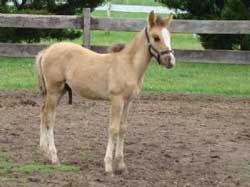
Argentine scientists performed the first cloning of a horse
The biotechnology company Bio Sidus Argentina reported that they performed the first cloning of a horse in the country.
It was done from skin cells of a Ñandubay. Now the goal is to give cloned specimens reproductive capacity.
“BS Ñandubay Bicentennial” is the name of the horse that was born in early August. In a press conference, it was confirmed that it has a “perfect health”, without losing the unique qualities of the species, their abilities to the pole and jumping.
The researcher in the Faculty of Agronomy of the University of Buenos Aires, Daniel Salamone said that “many riders choose to neuter their horses when they are young so they have greater athletic performance, but later when the horse has reached its full physical state, they regret because they can not have babies.”
Indeed, the great achievement of this experiment is the possibility of providing the reproductive capabilities cloned specimens.
The horse cloning process began with the removal of cells from the skin of another Ñandubay specimen and egg of a mare, which were fused in vitro.
Nine days after this process, the resulting embryo was inserted into the mare for it to give birth “naturally” after 340 days.
